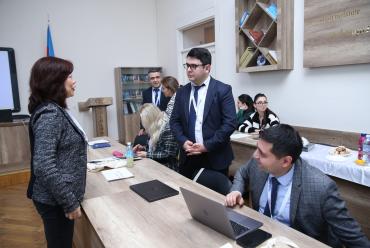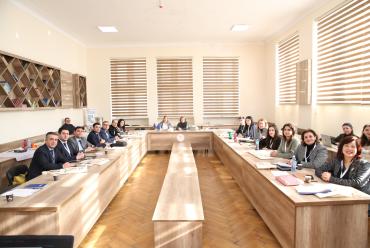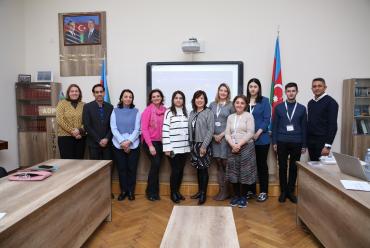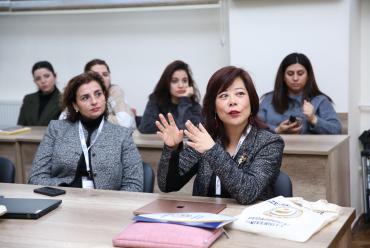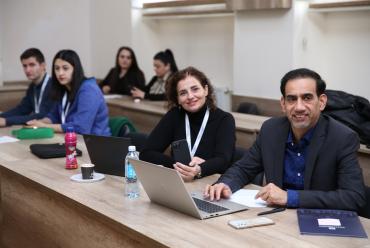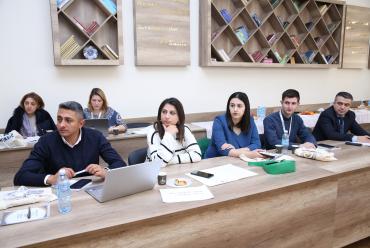Enhancing Quality Assurance in Higher Education: ASPU Hosts Transformative IQAinAR Study Visit
Baku, Azerbaijan, January 20, 2024 – The Azerbaijan State Pedagogical University (ASPU) concluded a dynamic and impactful study visit under the Erasmus+ KA2 program from January 15 to January 19, 2024. This event, organized as part of the Internal Quality Assurance in Higher Education Institutions in Armenia and Azerbaijan (IQAinAR) initiative, convened 21 international participants to share expertise, foster collaboration, and enhance the quality of higher education systems.
Promoting International Collaboration for Quality Education
The IQAinAR study visit brought together stakeholders from various universities and countries, reflecting a collective commitment to advancing internal quality assurance (IQA) practices. The program’s agenda combined expert-led sessions, collaborative workshops, and cultural exploration, offering a holistic approach to achieving its objectives.
Day-by-Day Breakdown of Key Activities
Day 1: Building Connections Through Networking
Participants arrived in Baku on January 15 and were welcomed with a networking dinner organized by ASPU. This informal gathering provided a platform to establish connections, exchange initial ideas, and set the tone for a productive week of learning and collaboration.
Day 2: Learning from Experts and Exploring Baku
On January 16, participants delved into the nuances of Azerbaijan's higher education quality assurance systems. A representative from the TKTA (the country’s quality assurance agency) shared insights into the national framework for quality assurance in higher education institutions (HEIs). This was followed by a presentation by Galib Sharifov of ASPU, who detailed the university’s internal quality assurance system and its role in fostering academic excellence.
The day concluded with a cultural exploration of Baku’s UNESCO-listed Old City, enabling participants to appreciate the host country’s rich heritage and history.
Day 3: Strategic Workshops and Planning
January 17 was dedicated to collaboration and strategic planning. Workshops focused on updates from partner universities regarding the development of strategic master plans and initial piloting phases of quality assurance initiatives.
- Morning sessions were led by UCAM and other partners, emphasizing progress reporting and refining strategies for institutional improvements.
- In the afternoon, discussions expanded to project management, covering key topics such as WP7 financial administration, WP5 quality control, and WP6 dissemination.
- The day concluded with a networking dinner hosted by Azerbaijan Technical University (AzTU), further strengthening international bonds.
Day 4: Academic Research and Publications
On January 18, the focus shifted to the role of academic research in enhancing institutional quality. Workshops addressed the identification of university needs and the development of training materials, aligned with WP3 and WP4 project components. Collaborative discussions among research teams explored ways to improve academic publications and foster innovative research practices across institutions.
Day 5: Closing Reflections and Next Steps
The final day, January 19, served as an opportunity to review progress and reflect on the study visit’s outcomes. Participants gathered for a closing session, which included presentations of feedback on the program and the awarding of attendance certificates.
The session highlighted the significant strides made toward improving internal quality assurance mechanisms and the strong partnerships formed during the visit.
Cultural Exchange: A Cornerstone of Collaboration
Beyond the academic sessions, the program emphasized the importance of cultural exchange. Visits to historical sites and local events enriched the participants’ experience, fostering a deeper understanding of Azerbaijan’s culture and its influence on the country’s approach to education and innovation.
Feedback and Future Directions
Participants lauded the event’s organization, relevance, and inclusivity. The study visit not only provided practical tools for implementing IQA systems but also reinforced the critical role of international collaboration in addressing shared challenges.
Moving forward, the IQAinAR initiative aims to build on the progress achieved during the study visit. With strengthened partnerships, enhanced strategies, and a shared vision for quality education, the participating institutions are poised to make lasting contributions to the global academic landscape.
